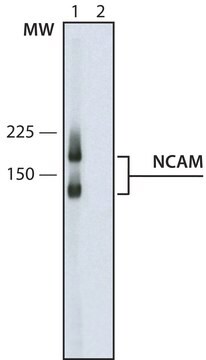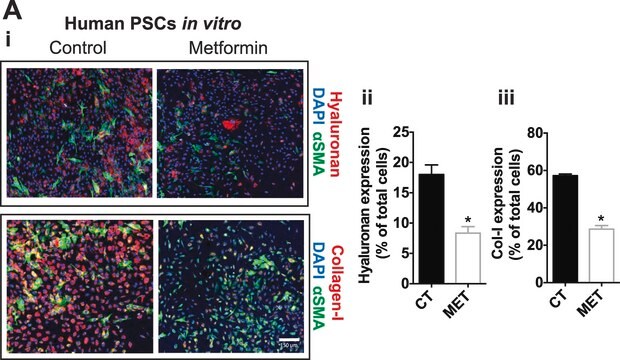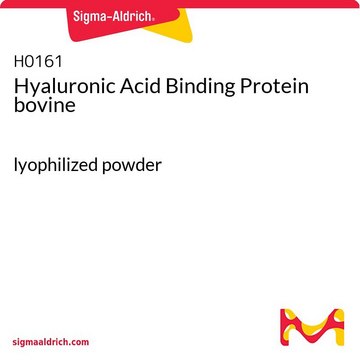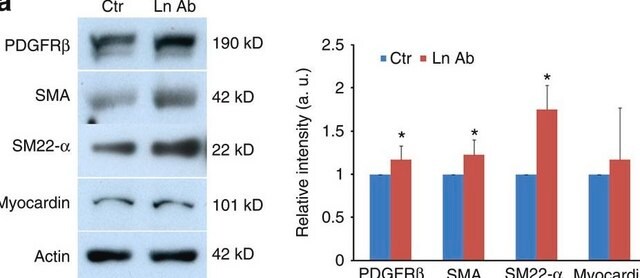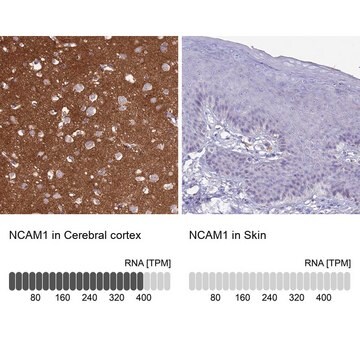MABF3137
Anti-MXRA8 Antibody, clone 9E9
Synonyme(s) :
Dual Ig domain-containing cell adhesion molecule, Limitrin, Matrix remodeling-associated protein 8
About This Item
Produits recommandés
Source biologique
mouse
Niveau de qualité
Forme d'anticorps
purified antibody
Type de produit anticorps
primary antibodies
Clone
9E9, monoclonal
Poids mol.
calculated mol wt 49.13 kDa
Produit purifié par
using protein G
Espèces réactives
human
Réactivité de l'espèce (prédite par homologie)
mouse
Conditionnement
antibody small pack of 100
Technique(s)
flow cytometry: suitable
inhibition assay: suitable
western blot: suitable
Isotype
IgG1κ
Séquence de l'épitope
N-terminal
Numéro d'accès Protein ID
Numéro d'accès UniProt
Température de stockage
-10 to -25°C
Informations sur le gène
human ... MXRA8(54587)
Spécificité
Immunogène
Application
Evaluated by Flow Cytometry in THP-1 cells.
Flow Cytometry Analysis: 1.0 µg of this antibody detected MXRA8 in one million THP-1 cells.
Tested Applications
Inhibition Assay: A representative lot block MXRA8 activity and reduced TH17 cell trafficking across the blood brain barrier. (Charabati, M., et al. (2022). Sci Transl Med. 14(626): eabj0473).
Flow Cytometry Analysis: A representative lot detected MXRA8 in Flow Cytometry applications (Charabati, M., et al. (2022). Sci Transl Med.14(626): eabj0473).
Western Blotting Analysis: A representative lot detected MXRA8 in Western Blotting applications (Charabati, M., et al. (2022). Sci Transl Med. 14(626): eabj0473).
Note: Actual optimal working dilutions must be determined by end user as specimens, and experimental conditions may vary with the end user.
Description de la cible
Forme physique
Reconstitution
Stockage et stabilité
Autres remarques
Clause de non-responsabilité
Vous ne trouvez pas le bon produit ?
Essayez notre Outil de sélection de produits.
Code de la classe de stockage
12 - Non Combustible Liquids
Classe de danger pour l'eau (WGK)
WGK 2
Point d'éclair (°F)
Not applicable
Point d'éclair (°C)
Not applicable
Certificats d'analyse (COA)
Recherchez un Certificats d'analyse (COA) en saisissant le numéro de lot du produit. Les numéros de lot figurent sur l'étiquette du produit après les mots "Lot" ou "Batch".
Déjà en possession de ce produit ?
Retrouvez la documentation relative aux produits que vous avez récemment achetés dans la Bibliothèque de documents.
Notre équipe de scientifiques dispose d'une expérience dans tous les secteurs de la recherche, notamment en sciences de la vie, science des matériaux, synthèse chimique, chromatographie, analyse et dans de nombreux autres domaines..
Contacter notre Service technique